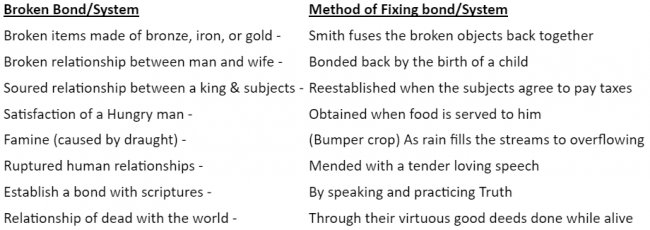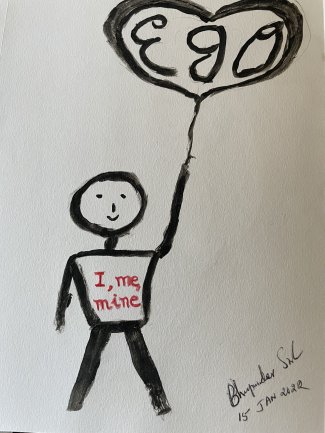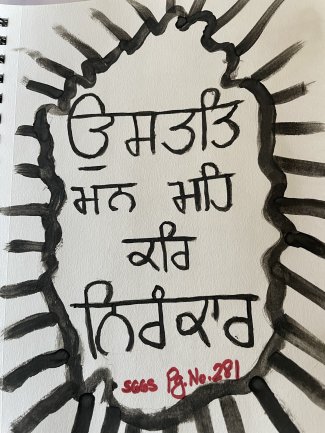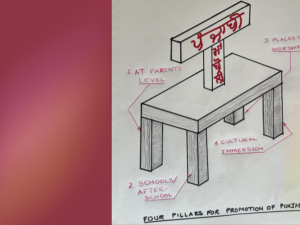The profound statement by Guru Nanak Ji shared as under sparked my interest on the subject of power of praise of Praiseworthy. Guru Ji says:
ਨਾਨਕੁ ਆਖੈ ਏਹੁ ਬੀਚਾਰੁ ॥ ਸਿਫਤੀ ਗੰਢੁ ਪਵੈ ਦਰਬਾਰਿ ॥੨॥
“Nanak aakhai eh beechaar. Sifatee gandh pavai dharabaar. 2.” (SGGS, Pg. No. 143)
Translation: Nanak says this after deep reflection: through the Lord's Praise, we establish a connection with His Court. ||2||
Basically, Guru Ji is saying that it is through the praises, the bond with Praiseworthy God is established. Before offering his own insight, Guru Ji has shared in the shabad (Page 143) how things broken are bonded back and fixed in the material world. Let us first review the examples Guru Ji shares:
Guru Ji then says that the bonding with divine is through praises. Guru Ji has expounded the theme again by saying:
ਧਾਤੁ ਮਿਲੈ ਫੁਨਿ ਧਾਤੁ ਕਉ ਸਿਫਤੀ ਸਿਫਤਿ ਸਮਾਇ ॥
“Dhaat milai phun dhaat kau sifatee sifat samai.” (SGGS, Pg. No. 18)
Translation: (Just) as metal is fused with metal (becoming indistinguishable), those who chant the Praises of the Lord are absorbed into the Praiseworthy Lord.
ਸਿਫਤੀ ਰਤਾ ਸਦ ਬੈਰਾਗੀ ਜੂਐ ਜਨਮੁ ਨ ਹਾਰੈ ॥
“Siphatee rataa sadh bairaagee jooaai janam na haarai.” (SGGS, Pg. No. 360)
Translation: Imbued with the Lord's Praises, one is forever a Bairaagee, a renunciate (not attached to the material world), and one's life is not lost in the gamble (of assembling material assets).
In a way it is saying that praise is the link that will bond the one engaged in the process of praising (ਸਿਫਤਿ) with the praiseworthy God (ਸਿਫਤੀ). Thus, the one engaged in praising becomes a true devotee, who has not gambled away the precious human life. There are other synonyms used in SGGS for praise as – ustat (ਉਸਤਤਿ), salaahanaa (ਸਲਾਹਣਾ), keerat (ਕੀਰਤਿ), jus (ਜਸੁ) etc. This is the method that Guru Nanak Ji adopted, prescribed it, and encouraged everyone else to practice. Let us briefly explore its background.
Brief Historical Background
There is an interesting incident that took place in Sultanpur, where Guru Nanak Ji was employed as the Modi (In charge of state Granary). Guru Ji used to get up daily early in the morning and take a bath in River Baeen, then engage in meditation under a jujube (ber) tree. One day Guru Ji went in the river for bath and disappeared for three days.
The entire city presumed that Guru Ji had drowned, but he came back alive. During that period, he had a vision of God’s presence and Guru Ji was entrusted by God to preach about Naam and sing praises of God. Guru Ji has shared with us in his own words the boon that he received when he was ushered in God’s presence:
ਸਚੀ ਸਿਫਤਿ ਸਾਲਾਹ ਕਪੜਾ ਪਾਇਆ ॥
“Sachee siphat saalaeh kapaRaa paiaa.” (SGGS, Pg. No. 150)
Translation: He has bestowed me the robes of honor of His True Praise and Glory.
Guru Ji also shares that he was instructed to sing the praises of Praiseworthy God in these words:
ਰਾਤਿ ਦਿਹੈ ਕੈ ਵਾਰ ਧੁਰਹੁ ਫੁਰਮਾਇਆ ॥
“Raath Dhihai Kai Vaar Dhhurahu Furamaaeiaa.” (SGGS, Pg. No. 150)
Translation: To sing His praises day and night, He gave me His Order.
Thereafter in year 1500 AD, Guru Ji decided to embark on his long journeys lasting 21 years to sing praises and through it spread the message of singing the praises of God. Guru Ji’s approach was unique considering the prevalent methods of the times were – fasting, penances, ceremonial yagnas etc. Guru Ji was not advocating praising of anyone and everybody or use of sweet words to get something done. Instead, Guru Ji considered any praise of others besides the Praiseworthy, as mere flattery which will only bring agony. To engage in praise is to see the limitations of self and limitlessness of the Praiseworthy. When Guru Nanak Dev Ji goes into praise mode, he finds that even the words he chooses for praise to be profoundly inadequate. He feels that instead of praising, he has slighted, diminished the Praiseworthy God by his words. Such is the humility in Guru Ji and the awe that he feels for the Praiseworthy God. Guru Ji says:
ਤੂ ਸੁਲਤਾਨੁ ਕਹਾ ਹਉ ਮੀਆ ਤੇਰੀ ਕਵਨ ਵਡਾਈ ॥ ਜੋ ਤੂ ਦੇਹਿ ਸੁ ਕਹਾ ਸੁਆਮੀ ਮੈ ਮੂਰਖ ਕਹਣੁ ਨ ਜਾਈ ॥੧॥
“Tu sulataan kahaa hau meeaa teree kavan vaddaiee. Joe too dheh su kahaa suaamee mai moorakh kahan na jaiee. 1.” (SGGS, Pg. No. 795)
Translation: You are the emperor, and I call You a chieftain - how does this add to Your greatness? (But saying even this is not my own capability.) Whatever (little) understanding I have (through your grace) I can only exercise that, O Lord, and Master; I am ignorant, and I cannot (even) chant Your Praises. ||1||
Here is another quote where Guru Angad Dev Ji again shares his limited ability, which prevents him from doing justice when engaged in praises:
ਹਉ ਕਿਆ ਸਾਲਾਹੀ ਕਿਰਮ ਜੰਤੁ ਵਡੀ ਤੇਰੀ ਵਡਿਆਈ ॥
“Hau kiaa saalaahee kiram ja(n)t vaddee teree vaddiaaiee.” (SGGS, Pg. No. 792)
Translation: I am a (mere insignificant) worm - how can I praise You, O Lord; Your glorious greatness is so great (way beyond my comprehension)!
Even the ability to notice, feel impressed by those virtues of the Praiseworthy is a sign of blessing. Now, let first look at the benefits of singing praises of Praiseworthy:
- Praising brings a paradigm shift
To engage in praise when facing a challenging situation, is a willing acceptance of the precarious situation one finds self in. It is an acceptance of one’s own inadequacy to handle the situation and seek Divine intervention. It is so powerful that it brings a paradigm shift from me to Him. Guru Ji says it brings about rejuvenation in these words:
ਨਾਨਕ ਸਿਫਤੀ ਰਤਿਆ ਮਨੁ ਤਨੁ ਹਰਿਆ ਹੋਇ ॥
“Nanak sifatee ratiaa mun tun hariaa hoi.” (SGGS, Pg. No. 1240)
Translation: O Nanak, imbued with the Lord's Praise, the mind and body blossom forth, rejuvenated.
It is human nature to blame others for our woes and troubles. But if we can draw our attention away from our problems, no matter how overwhelming they are, lifting our gaze to God, our sagging spirits will be lifted as well. As a consequence, gloom; the feeling of anxiety; fear or isolation that had overwhelmed us in the midst of the crisis will be off our shoulders and we will feel rejuvenated. Guru Arjan Dev Ji demonstrated its efficacy, when Sulhi Khan mounted an attack on Guru Ji from Lahore and his shabads on the subject paint its complete picture. Guru Ji’s well-wishers from Lahore had informed him about the impending attack along with three suggestions to ward off the attack. The suggestions were:
- Send a letter to Sulhi Khan clarifying Guru Ji’s viewpoint
- Send two representatives to present the other (Guru’s) perspective
- Take some defensive counter measures
Guru Ji’s course of action was in his words:
ਮੈ ਸਭੁ ਕਿਛੁ ਛੋਡਿ ਪ੍ਰਭ ਤੁਹੀ ਧਿਆਇਆ ॥੧॥
“Mai sabh kishh shhodd prabh thuhee dhhiaaeiaa .” (SGGS, Pg. No. 371)
Translation: But I have renounced everything, and I meditate only on You, God.
Guru Ji’s deep faith prevailed, as Sulhi Khan died by falling in the fire of the brick-kiln in Hahaeree village from the horse he was riding, even before reaching Amritsar with his expedition. Guru Ji thanked God for the providence in these words:
ਸੁਲਹੀ ਤੇ ਨਾਰਾਇਣ ਰਾਖੁ ॥ ਸੁਲਹੀ ਕਾ ਹਾਥੁ ਕਹੀ ਨ ਪਹੁਚੈ ਸੁਲਹੀ ਹੋਇ ਮੂਆ ਨਾਪਾਕੁ ॥੧॥ ਰਹਾਉ ॥
“Sulhi tae naaraaein raakh. Sulhi kaa haathh kahee na pahuchai sulhi hoe mooaa naapaak. Rahaao.” (SGGS, Pg. No. 825)
Translation: The Lord saved me from Sulhi Khan. Sulhi did not succeed in his plot, and he died in disgrace (what worse disgrace for a Muslim than to die in a fire and be reduced to ashes instead of being buried).
When facing any impending danger, recognizing our own limits we seek Divine intervention, then our eyes are lifted up from our threatening circumstances. Here, in this incident we see that Guru Ji meditated in God’s presence, and not just his spirits were raised, even the impending threat failed to materialize.
- Praise changes minds, ridding us of our evils as ego and pride:
ਗੁਣ ਗੋਵਿੰਦ ਨਿਤ ਗਾਵੀਅਹਿ ਅਵਗੁਣ ਕਟਣਹਾਰ ॥
“Gunn govindh nit gaave'eeh avagun kaTanahaar.” (SGGS, Pg. No. 48)
Translation: Continually sing the Glorious Praises of the Lord of the Universe, the destroyer of demerits.
ਗੁਨ ਗਾਵਤ ਤੇਰੀ ਉਤਰਸਿ ਮੈਲੁ ॥ ਬਿਨਸਿ ਜਾਇ ਹਉਮੈ ਬਿਖੁ ਫੈਲੁ ॥
“Gunn gaavat teree utaras mail. Binas jai haumai bikhh phail.” (SGGS, Pg. No. 289)
Translation: Chanting His Glories, your filth shall be washed off. The all-consuming poison of ego will be gone.
The ego creates the wall that separates us from God, when the wall falls then the changes have taken place within - ego is rid, pride has departed, and the virtues have been cultivated. When ego and pride depart one merges in divine as per Gurbani (ਹਉਮੈ ਜਾਈ ਤਾ ਕੰਤ ਸਮਾਈ ॥ SGGS, Pg. No. 750). The ego manifesting as pride lays claims of ownership over everything. While the concept of Oneness is anchored on belief that only one God pervades, and everything belongs to Him. So, when Oneness is experienced then a merger with Praiseworthy has been experienced as well. Those who become Guru oriented taking Guru’s advice start praising God and Naam, become free of ego.
ਗੁਰਮੁਖਿ ਨਾਮੁ ਸਲਾਹੀਐ ਹਉਮੈ ਨਿਵਰੀ ਭਾਹਿ ॥੧॥ ਰਹਾਉ ॥
“Gurmukh naam salaaheeaai haumai nivaree bhaeh. 1. Rahaau.” (SGGS, Pg. No. 48)
Translation: The Gurmukh praises the Naam, and the fire of egoism (haumai) is extinguished (from within). ||1||Pause||
- Praise bestows God’s mercies upon us
We all deal with stress and anxiety in our lives. We can choose either to live with it or we can have it alleviated. Guru Ji has shared with us how it can be alleviated when Guru’s mercies are received:
ਗੋਪਾਲ ਗੁਣ ਨਿਤ ਗਾਉ ਨਾਨਕ ਭਏ ਪ੍ਰਭ ਕਿਰਪਾਲ ॥੮॥੩॥
“Gopal gunn nit gaau Nanak bhae prabh kirapaal. 8.3. (SGGS, Pg. No. 1018)
Translation: Constantly sing the Glorious Praises of the Lord of the World, O Nanak, God becomes merciful to those (who sing His praises). ||8||3||
When we seek the Sanctuary of God, our mind is attuned to the love of the Beloved God. The Beloved becomes merciful, showers His blessings, which resolves all our affairs. The biggest affair of all the affairs is coming and going in incarnations and even that gets resolved by singing His praises:
ਤੇਰੀ ਸਿਫਤਿ ਸੁਆਲਿਉ ਸਰੂਪ ਹੈ ਜਿਨਿ ਕੀਤੀ ਤਿਸੁ ਪਾਰਿ ਲਘਾਈ ॥
“Teree sifat suaaliau saroop hai jin keetee tis paar laghaiee.” (SGGS, Pg. No. 301)
Translation: Oh! Beautiful, Singing Your Praise is beautiful as You help them to ‘cross over’ the worldly ocean (of cycles of birth and death).
So, where does the one engaged in praising arrive at? Guru Nanak Dev Ji says:
ਸਿਫਤਿ ਸਹਜ ਘਰਿ ਗੁਰੁ ਕਰਤਾਰੁ ॥੨॥
“Sifat sahaj ghar gur karataar. 2.” (SGGS, Pg. No. 413)
Translation: Praising the Lord, in the house of Sahaj (meaning poise – implies immortality), he attains the Guru, the Creator. ||2||
- Those Singing Praises are exalted
ਜਿਸ ਨੋ ਬਖਸੇ ਸਿਫਤਿ ਸਾਲਾਹ ॥ ਨਾਨਕ ਪਾਤਿਸਾਹੀ ਪਾਤਿਸਾਹੁ ॥੨੫॥
“Jis no bakhase sifat saalaeh. Nanak paatisaahee paatisaahu. 25.” (SGGS, Pg. No. 5)
Translation: One who is blessed with the gift of singing the Praises of the Lord, O Nanak, is the king of kings. ||25||
Guru Ji is saying that one blessed with singing praises of God becomes a giver and does not remain a beggar. S/he becomes an emperor and is not a pauper, worthless, dejected, desolate, failure, lifeless or one marooned in gloom. That is a real-life achievement. Guru Arjun Dev Ji has expressed that achievement in these words:
ਜਿਨਿ ਜਨਿ ਅਪਨਾ ਪ੍ਰਭੂ ਪਛਾਤਾ ॥ ਸੋ ਜਨੁ ਸਰਬ ਥੋਕ ਕਾ ਦਾਤਾ ॥
“Jin jan apanaa prabhoo pachhaataa. So jan sarab thok kaa dhaataa.” (SGGS, Pg. No. 286)
Translation: Those humble beings who realize God are the givers of all things.
- Praise fosters awareness of God’s presence with us
When we praise God, we gain intimacy and start feeling Him closer. If the feeling of closeness is in our awareness, we will start seeing him within as well as outside everywhere. When that is experienced then only awe of admiration comes out of the mouth as:
ਵਾਹੁ ਖਸਮ ਤੂ ਵਾਹੁ ਜਿਨਿ ਰਚਿ ਰਚਨਾ ਹਮ ਕੀਏ ॥
“Vaahu khasam tu vaahu jin rach rachanaa ham ke'aee.” (SGGS, Pg. No. 788)
Translation: Waaho! Waaho! You are wonderful and great, O Lord and Master; You created the creation, and made us.
Why Praise the Praiseworthy
ਵਿਸਮਾਦੁ ਸਿਫਤਿ ਵਿਸਮਾਦੁ ਸਾਲਾਹ ॥
“Visamaadh siphat visamaadh saalaeh.” (SGGS, Pg. No. 464)
Translation: Wonderful is His Praise, wonderful is His adoration.
The question arises as to why do we have to praise God? Does He need the praise? In fact, God does not need any praise, even though He has provided for the whole life to everyone right from birth with no expectations in return. So, why we need to praise? Because we were fully engaged in praise and remembrance when in the womb during the pregnancy and had promised Him to do so when in human life. However, after birth the engagement and allure of family and the physical world were so captivating that we completely forgot about the promise made in the womb. Gurbani portrays the picture in these words:
ਲਿਵ ਛੁੜਕੀ ਲਗੀ ਤ੍ਰਿਸਨਾ ਮਾਇਆ ਅਮਰੁ ਵਰਤਾਇਆ ॥
“Liv chhuRakee lagee tirasanaa maiaa amar varataiaa.” (SGGS, Pg. No. 921)
Translation: The mind attunement to Supreme Divine Being breaks, and the baby becomes attached to desires as cravings start; the temptation in the world-play (of Maya) gripped (the newborn).
The promise was that we will spend every breath in praise and remembrance. However, the enticement of physical world and the relations were mesmerizing enough to make us forget the promise. The body, mind, soul, and everything else that enable us to experience life fully is a result of His boon, therefore we need to thank Him through praises. In fact, any other praise besides God’s is considered as vain, and in insipid taste.
ਵਿਣੁ ਨਾਵੈ ਹੋਰੁ ਸਲਾਹਣਾ ਸਭੁ ਬੋਲਣੁ ਫਿਕਾ ਸਾਦੁ ॥
“Vin(h) naavai hor salaahanaa sabh bolan phikaa saadh.” (SGGS, Pg. No. 301)
Translation: Without (Your) Name, all other praise and speech is insipid and tasteless.
Those blessed with the boon of praises are exalted becoming recipient of highest virtues.
Guru Ji says while those who do not engage in singing Lord’s praises are in league with Satan all the time:
ਸਿਫਤੀ ਸਾਰ ਨ ਜਾਣਨੀ ਸਦਾ ਵਸੈ ਸੈਤਾਨੁ ॥
“Sifatee saar na jaananee sadhaa vasai saitaan.” (SGGS, Pg. No. 790)
Translation: They do not know the value of the Lord's Praises, and Satan is always with them.
Those who engage in singing His praises, they cross the worldly ocean and merge in Him:
ਤੂੰ ਸਚਾ ਸਾਹਿਬੁ ਸਿਫਤਿ ਸੁਆਲ੍ਹ੍ਹਿਉ ਜਿਨਿ ਕੀਤੀ ਸੋ ਪਾਰਿ ਪਇਆ ॥
“Too(n) sachaa saahib sifat suaali(h)au jin keetee so paar piaa.” (SGGS, Pg. No. 469)
Translation: You are the True Lord and Master; Your Praise is so beautiful. One who sings it, is carried across (the worldly ocean).
ਤੇਰੀ ਸਿਫਤਿ ਸੁਆਲਿਉ ਸਰੂਪ ਹੈ ਜਿਨਿ ਕੀਤੀ ਤਿਸੁ ਪਾਰਿ ਲਘਾਈ ॥
“Teree siphat suaaliau saroop hai jin keetee tis paar laghaiee.” (SGGS, Pg. No. 301)Translation: Singing Your Praises is a beautiful act; those who engage in it You help them cross over the worldly ocean (of cycles of birth and death).
Guru Ji has provided a very clear road map for what should be done. Guru Ji says sing praises of the Creator (God) day and night in these words:
ਸੁਤਿਆ ਗੁਰੁ ਸਾਲਾਹੀਐ ਉਠਦਿਆ ਭੀ ਗੁਰੁ ਆਲਾਉ ॥
“Sutiaa gur saalaaheeaai uThadhiaa bhee gur aalaau.” (SGGS, Pg. No. 758)
Translation: Praise the Guru while you are asleep and call on the Guru while you are up and awake.
ਸਾਹਿਬੁ ਸੋ ਸਾਲਾਹੀਐ ਜਿਨਿ ਕਾਰਣੁ ਕੀਆ ॥
“Sahib so saalaaheeaai jin kaaran keeaa.” (SGGS, Pg. No. 766)
Translation: So, praise your Lord and Master, who created the creation.
When a realization comes out of our heart to sing the praises a prayer comes out:
ਨਾਨਕ ਕੀ ਅਰਦਾਸਿ ਪ੍ਰਭ ਜੀਵਾ ਗੁਨ ਗਾਏ ॥੪॥੧੨॥੪੨॥
“Nanak kee aradhaas prabh jeevaa gun gaae. 4.12.42.” (SGGS, Pg. No. 811)
Translation: This is Nanak's prayer, O God, may I live by singing Your Glorious Praises. ||4||12||42||
But that can be only accomplished when we develop a heightened awareness capable of observing something worth appreciating. Then the Divine Power behind it will also noticed and a prayer for such awareness comes out:
ਤੇਰੇ ਗੁਣ ਗਾਵਾ ਦੇਹਿ ਬੁਝਾਈ ॥ ਜੈਸੇ ਸਚ ਮਹਿ ਰਹਉ ਰਜਾਈ ॥੧॥ ਰਹਾਉ ॥
“Terae gunn gaavaa dheh bujhaiee. Jaise sach meh rahau rajaiee. 1. Rahaau.” (SGGS, Pg. No. 795)
Translation: Please bless me with the awareness of your virtues, so that I may sing of them and emulate them. May I ever dwell in Your Divine Will (Truth). ||1||Pause||
In the process of appreciating those virtues, our own limitations are realized transporting us in awe. These words of awe become the catalyst in downsizing our puffed-up ego. The ego is the wall that separates us from our Creator God. So, what should we ask from our Guru Ji? Guru Ji, please make us Guru oriented so that we engage in praises of Praiseworthy and become worthy of His blessings:
ਗੁਰਮੁਖਿ ਹੋਵੈ ਸੋਈ ਬੂਝੈ ਗੁਣ ਕਹਿ ਗੁਣੀ ਸਮਾਵਣਿਆ ॥੧॥
“Gurmukh hovai soiee boojhai gun keh gunee samaavaniaa. 1.” (SGGS, Pg. No. 110)
Translation: Those who becomes Guru oriented – Gurmukh, get the understanding. They start chanting His Glorious Praises, getting absorbed into the Lord of Virtue. ||1||
By becoming absorbed in Supreme Being even the uneventful life becomes honorable:
ਇਉ ਪਤਿ ਪਾਟੀ ਸਿਫਤੀ ਸੀਪੈ ਨਾਨਕ ਜੀਵਤ ਜੀਵੈ ॥
“Eiau pat paaTee sifatee seepai Nanak jeevat jeevai.” (SGGS, Pg. No. 995)
Translation: Thus, the torn and tattered honor (as the precious human life was wasted) is sewn back up again, through the Lord's Praise, O Nanak, and one lives the true and principled life.
Thus, Praise of the Praiseworthy fulfills the purpose for which we were created, bringing fulfillment in life. So, let us conclude with a prayer to God for grace so that we can say, sing His praises.
ਉਸਤਤਿ ਮਨ ਮਹਿ ਕਰਿ ਨਿਰੰਕਾਰ ॥ ਕਰਿ ਮਨ ਮੇਰੇ ਸਤਿ ਬਿਉਹਾਰ ॥
“Ustat mun meh kar nirankaar. Kar mun merae sat biauhaar.” (SGGS, Pg. No. 281)
Translation: Praise the Formless Lord in your mind. O my mind, make this your true occupation.
In summary, focusing the awareness on the praises of Praiseworthy results in:
=====🡺 Forgetting about our own demerits/limits/vices
==🡺🡺 Focusing on the treasure house of virtues, the Praiseworthy God
=🡺🡺🡺 Experiencing the merger in Praiseworthy God (Oneness).
When we return back with the treasure of praises, God is pleased as someone has understood the worldly game and has come out of it successfully:
ਹਰਿ ਜਸੁ ਵਖਰੁ ਲੈ ਚਲਹੁ ਸਹੁ ਦੇਖੈ ਪਤੀਆਇ ॥੧॥ ਰਹਾਉ ॥
“Hur jas vakhar lai chalahu sahu dhekhai pateeaai. 1. Rahaau.” (SGGS, Pg. No. 22)
Translation: Take the Merchandise of the God's Praises with you (from this world). Your Husband God sees it, He will be pleased. ||1||Pause||
References:
- Padam, Piara Singh. Guru Granth Vichar Kosh (2004). Punjabi University
- www.Sikhitothemax.com
- www.Srigranth.org
- Singh, Trilochan and others. The Sacred Writings of the Sikhs (UNESCO). Orient Longmans













